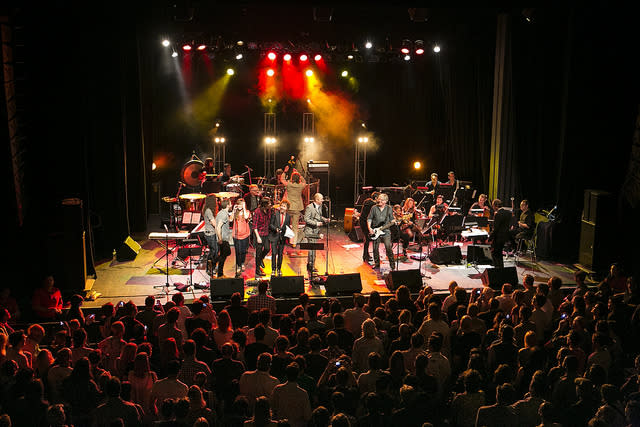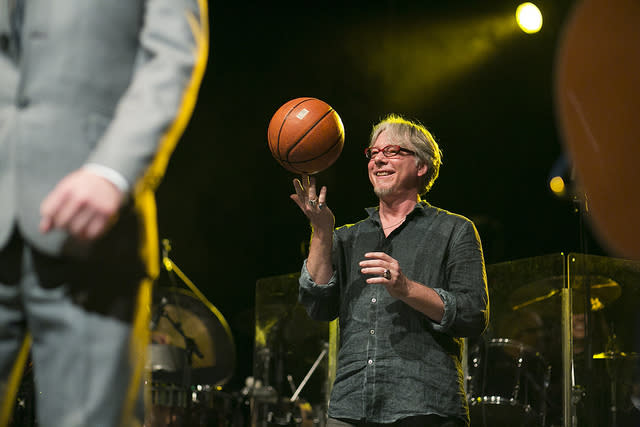Big Star’s ‘Third’ Comes to Your House
The all-star collective that’s named for and pays tribute to Big Star’s tortured classic cult album Third has played about a dozen shows over the years in select cities, but the logistics and expense of assembling the production has meant that many fans haven’t had the opportunity to experience the magic. That changes with the April 21 release of Thank You, Friends: Big Star’s Third Live … And More, a two-CD/DVD or Blu-ray package that captures the group’s April 2016 show at the Alex Theatre in Glendale, Calif., in all its glory.
Big Star was the seminal Memphis combo led by Alex Chilton that put out three critically acclaimed albums in the ’70s before falling apart. Co-founder Chris Bell left the group after the release of its 1972 debut #1 Record, disappointed that it failed to find an audience. He died in a car accident in 1978 at the age of 27.
Although Big Star didn’t initially achieve fame, it has been a huge influence on a number of bands through the years. It began to receive belated notice in the ’80s, when the Replacements released the single “Alex Chilton,” a tribute to the band’s leader, and when the Bangles covered the group’s “September Gurls.” From 1999 to 2006, Cheap Trick’s version of the band’s “In the Street” served as the theme song for That ’70s Show. Chilton died of a heart attack in March 2010, while original bassist Andy Hummel succumbed to cancer in July of that same year.
Big Star’s Third was first performed live in Carrboro, N.C., in December 2010 and has sporadically been done live since then. For the show featured in Thank You, Friends, the assembled cast of players — under the music direction of former dB’s member Chris Stamey — includes sole surviving original Big Star member Jody Stephens; Ken Stringfellow and Jon Auer of the Posies and the ’90s version of Big Star; Wilco’s Jeff Tweedy and Pat Sansone; Mike Mills of R.E.M.; Robyn Hitchcock; Yo La Tengo’s Ira Kaplan; Dan Wilson of Semisonic; Benmont Tench of Tom Petty & the Heartbreakers; Mitch Easter of Let’s Active; and relative newcomers Jessica Pratt, Brett Harris, Django Haskins, and Skylar Gudasz. They’re joined by an orchestra that includes the Kronos Quartet conducted by Carl Marsh, who penned the original orchestrations heard on the album.
The film was directed by Benno Nelson of the production company Yes Equal Yes, whose previous credits include Dwight Yoakam: Saw You Comin’ and Tweeked, Geeked and Freaked: On the Road with the Crystal Method. He landed the gig from Concord Records executive Sig Sigworth, who also served as one of the producers of the film.
The music of Big Star was not new to Nelson, who discovered the band back in the ’90s when he fronted the Minneapolis-based combo National Dynamite. “The guitarist in my band turned me on to them,” Nelson says. “We were playing music in that vein already.”
Nelson first experienced Big Star’s catalog chronologically, starting with 1972’s #1 Record, then 1974’s Radio City, and eventually the more challenging Third/Sister Lovers, recorded in ’75 but not released until ’78. Before lensing the concert featured in the film, Nelson revisited those records and found his love for the band grew with each subsequent release.
“I like #1 Record, that’s a solid record,” he said. “Radio City is more interesting. It’s a little looser and kind of more off the rails and rocks a little harder; and Third, to me that’s the most groundbreaking record. You have songs like ‘Kanga Roo,’ which sonically is kind of like the Velvet Underground on downers and steroids. It has that kind of harrowing feel sometimes, but it’s offset by these beautiful melodies and the glorious fall-apart production. It just sounds so unhinged.”
Although the Big Star story has already been documented in Big Star: Nothing Can Hurt Me, a documentary released in 2012, Thank You Friends is more than just a straight concert film. It also features interviews with the ensemble’s various players, who offer insight into the band and the Third album.
“I really wanted to let these musicians who have a much deeper, stronger connection to the music than I do tell the story back to me,” Nelson said. “I wanted to cover enough ground where it would be interesting enough to the fans, but newcomers coming into it wouldn’t be totally lost either.”
“I think Big Star’s story is pretty interesting and fascinating,” Nelson added. “From the unfortunate death of Chris Bell, to Alex [Chilton] kind of losing it emotionally and spiritually — and in the midst of this, all this incredible music. I think anybody that’s into music, especially guitar-driven pop or rock music, there’s a natural hook there for them. If they’ve only heard the name and don’t know much about the band I’m hoping that the movie gets them to go listen to the albums.”
Nelson points to Stringfellow’s interview segment as one that’s particularly insightful. “Big Star is so interesting, because the perspectives to me are so mature,” Stringfellow says in the film. “There’s nothing like the cartoonish emotions of, like, KISS. … I think Big Star is interesting because it just seems normal. It’s realistic. That’s kind of how indie rock emerged, as a realistic counterpart to the fantasy that’s presented by mainstream rock. Big Star is way ahead of that. There’s no fantasy element.”

To set off the interviews from the performances, Nelson shot the latter in black and white, while the performances are in brilliant color. He also sought to “mirror the offbeat nature of the album by playing around with different, unconventional compositions, by framing someone to the far left or far right.” In the editing process, he used cuts that echo the uneasy feel of moody songs such as “Holocaust” and “Kanga Roo.”
The film begins with various songs from #1 Record and Radio City, as well as Chris Bell’s “I Am the Cosmos” before moving on to Third. While such indie-rock luminaries as Mills, Tweedy, Kaplan, Stringfellow, and Hitchcock deliver stunning performances, the real surprise is the lesser-known talents. “What’s so cool about that is that Chris [Stamey] has sort of created a farm of young Big Star torchbearers,” Nelson said. “They’re all from North Carolina. Chris lives there, so he’s kind of brought these younger musicians on board that can kind of carry the torch to the next generation, and they do such an amazing job.”
Nelson went on to call Brett Harris’s take on “Kanga Roo” incredible. “He just nailed it. The youngest people arguably carry the most emotional weighty songs,” he added, referring to Skylar Gudasz’s tender reading of “Thirteen” and Django Haskins devastating take of “Holocaust.” “Those are huge emotional tent poles in the set.”
Mills, who sings lead on “September Gurls” and “Jesus Christ,” and trades off vocals with Harris on “In the Street,” agreed. “That’s my favorite part of this entire project,” he said. “I call ’em kids because they’re younger than me, but the core group of musicians that Chris Stamey put together in North Carolina when we first started doing this — and they’ve become the core group of musicians for this thing — they’re all just so talented. They’re one of my favorite reasons for continuing this. Just to watch and hear what they do, because they’re all amazing.”
Aside from his turns at the microphone, one of Mills’s personal highlights from the film is sharing the spotlight with saxophonist Ralph Carney on “Jesus Christ,” a song Mills covered with R.E.M. on a 2002 fan club Christmas single. Mills also had the honor of playing the basketball on Hitchcock’s woozy rendition of “Downs.”
“That’s actually what [Big Star] used in the studio,” he said, “although I don’t know if they were bouncing it. They may have just been hitting it with a stick. Chris asked me if I would be the basketball player, and I said, ‘Sure.’ I may be one of the few people onstage that actually has shot a basketball, not that that has anything to do with it.”

As for Stephens, who plays drums on the bulk on the songs and steps up to sing lead on “For You” and “Blue Moon,” he hopes Thank You, Friends will help further the legacy of Big Star and honor the memories of his late friends Chilton, Bell, Hummel, and producer Jim Dickinson. “People seem to be switching on to the band daily,” he said. “It’s amazing how we keep doing these things and doors open and new possibilities open, and I get to keep doing it with all these wonderful friends and players. I love sharing that time with everybody and playing that music.”
When we first spoke to Stephens about the film, he hadn’t seen a finished cut, but after he caught the premiere at South by Southwest he called us back, urging us to catch Thank You, Friends on the big screen, with surround sound if possible. “It’s just breathtaking,” he said. “It literally took my breath away.”
Follow Craig Rosen on Twitter.
